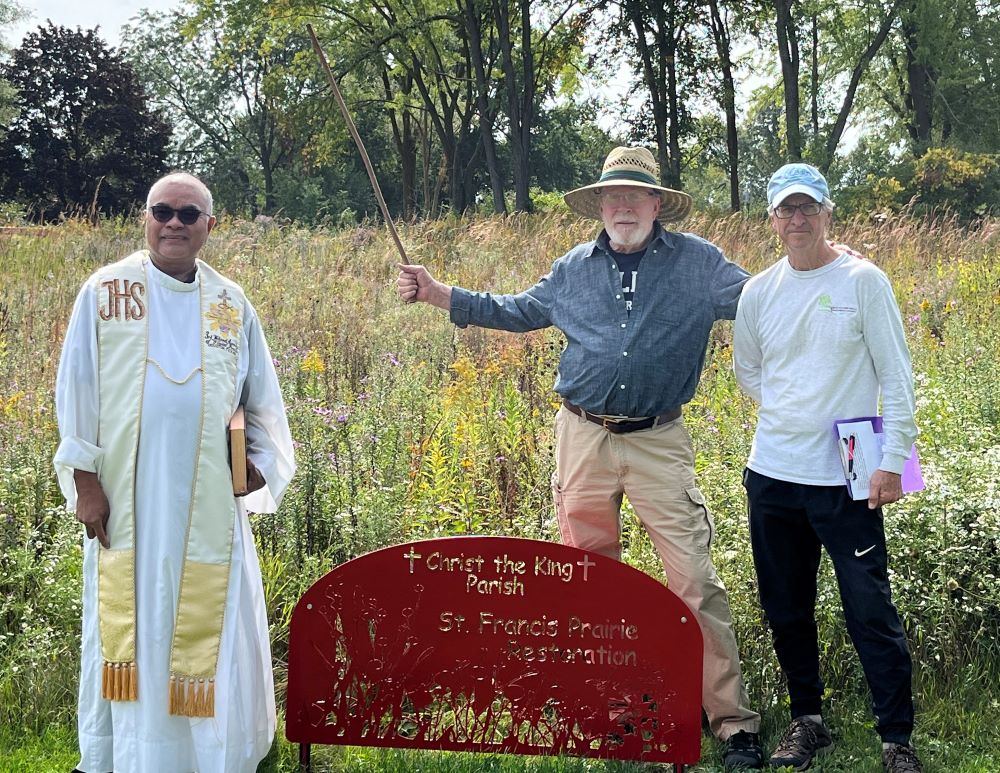
Fr. Carlos Saligumba, pastor of Christ the King Church in Wonder Lake, Ill., poses with John Shiel and Dave Zeiger at a sign for the St. Francis prairie restoration project, which was 22 years in the making. About 20 people gathered Sept. 24 for the dedication of the project to St. Francis of Assisi, patron saint of ecology and animals. (OSV News/The Observer/Megan Peterson)
Birds whistled, grass rustled and many bumblebees buzzed as about 20 people gathered at Christ the King Parish in the Diocese of Rockford Sept. 24 for the dedication of a prairie restoration project to St. Francis of Assisi, patron saint of ecology and animals.
The dedication marked a milestone for the 22-year project begun by John Shiel, Christ the King parishioner; and Dave Zeiger, a resident of the surrounding neighborhood. Since 2001, parishioners and neighbors have come together for a ministry of environmental stewardship — and the work continues.
The dedication opened with a reading by Deacon David Auld from Genesis 1, which recounted the very beginning of the prairie: the creation of plants and fruit-bearing trees, and then God's gift of his creation to mankind. "See, I give you every seed-bearing plant on all the earth and every tree that has seed-bearing fruit on it to be your food."
After a psalm, Fr. Carlos Saligumba, pastor, said a prayer of blessing "O Holy Lord and Father, you have commanded us to work the land and cultivate it — your devoted people, John and Dave.
"Now we pray that you will grant us an abundant harvest from our fields, especially with these beautiful flowers and species that reflect your goodness and your generosity in the beauty and truth of who we are as your sons and your daughters," he prayed.
He then set out on a mowed pathway winding through the prairie, sprinkling the flowers and grasses with holy water. Parishioners joined in the blessing walk and prayed aloud.
Advertisement
When the group returned, Shiel gave a brief reflection on the past and future of the St. Francis of Assisi Prairie.
More than 20 years ago, Zeiger noted that Christ the King had a new pastor and asked Shiel what that pastor would think of a prairie restoration project. Shiel spoke to then-pastor Fr. Louis Tosto, who approved a 2-acre project.
Longtime friends Shiel and Zeiger have many years of environmental work and study between them. Zeiger is a retired earth science teacher and serves The Land Conservancy of McHenry County as Oak Conservation outreach specialist. Shiel has a master's degree in forestry and served as educational services manager at the McHenry County Conservation District for 15 years.
They started by clearing out the "unwanted, non-native" shrubs and trees to admit sunlight. They conducted yearly prescribed burns after obtaining an open burning permit from the Illinois Environmental Protection Agency.
"This is a work in progress. This is not a thing that's done. This is not the prairie that John and Dave and other volunteers from the neighborhood and the parish restored. It is a place we are restoring," Shiel told the group.
"And by the way — " he said, pausing. " — Help is needed!"
The humorously pointed comment drew laughs as he continued. "Help is always gonna be needed. In fact, the word would be ‘required.' “
The necessity of caring for creation is discussed by Pope Francis in his 2015 encyclical Laudato Si':
There is a nobility in the duty to care for creation through little daily actions, and it is wonderful how education can bring about real changes in lifestyle. Education in environmental responsibility can encourage ways of acting which directly and significantly affect the world around us.
On Oct. 4, the feast of St. Francis of Assisi, Pope Francis issued a follow-up to Laudato Si' — an apostolic exhortation titled Laudate Deum ("Praise God"). It references the encyclical but its message is even more urgent. The text reiterates key messages that have resonated throughout Pope Francis' papacy -- among them, concern for the marginalized, care for creation, human ecology and a "synodal" approach to resolving global problems.
In the past year, Shiel and Zieger saw the impact of environmental concerns on the world around them multiplied, as the sower's parable goes, "a hundredfold."
Last August, the two led a local wildflower preservation group on a walk through the prairie. Shiel noticed an unusual pink plant in the thicker growth and investigated it shortly after.
He found it was a rare plant and that other rare plants were just feet away. Native species had gotten to the prairie without being seeded. A study by a soil expert confirmed his and Zeiger's guess: intact topsoil of natural native Illinois prairie (which makes up less than .01 percent of the state).
The discovery spurred Shiel to work at the prairie daily, and he hopes it will inspire similar projects at other churches and that, following in St. Francis of Assisi's footsteps, people will discover more about God by being in nature.
Shiel closed with a colorful illustration of working in nature.
He gestured to an orange bucket filled with tools. "The project — call it a lot of things — but you could call it: the ministry of the blade," he said, and held up a lopper. He continued with more tools, drawing murmurs of agreement from the group. "And the blade. And the blade."
"You could call it: the ministry of the kitchen matches," he continued. "You could call it: the ministry of the seeds that we collect and then distribute.
"You could call it — my favorite — the ministry of the plastic bucket," he said to laughs and clapping.
Saligumba concluded, "How about we call it: the ministry of St. Francis of Assisi."







